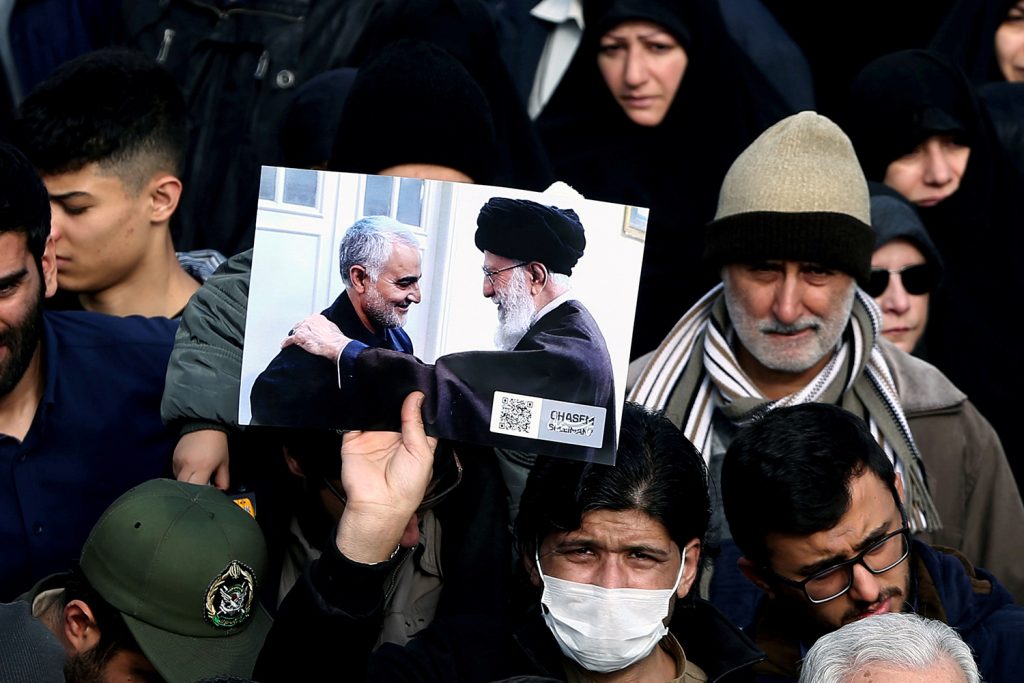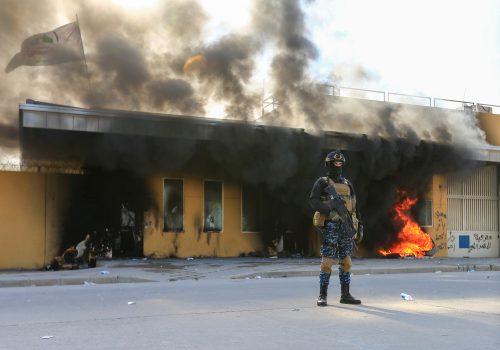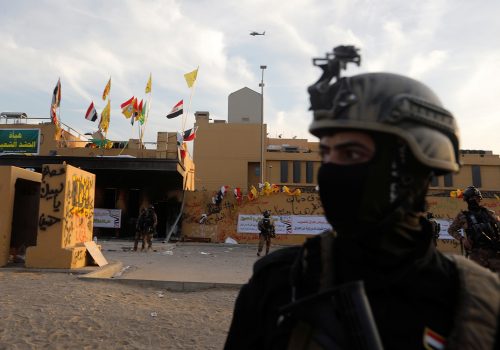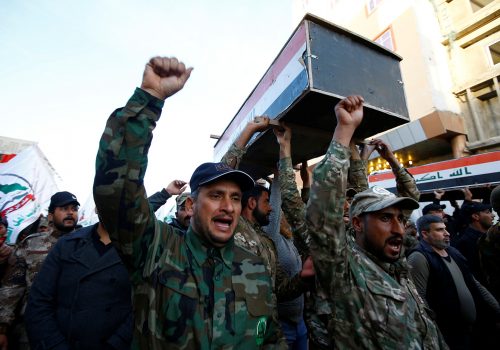The assassination of a top Iranian military official in Iraq on January 2 is the most dramatic step yet in the ongoing escalation between the United States and Iran in the Middle East.
Qasem Soleimani, leader of the Quds force within the Islamic Revolutionary Guard Corps (IGRC), was killed by a US drone strike outside the Baghdad airport, along with other Iraqi militia leaders. The attack comes just days after the United States hit the Iranian-backed group Kata’ib Hezbollah in Iraq and Syria, which led to intense protests outside the US embassy in Baghdad.
US Secretary of Defense Mark Esper said that the “Soleimani was actively developing plans to attack American diplomats and service members in Iraq and throughout the region.” Soleimani and his Quds force has long been accused of supporting terrorism throughout the Middle East and facilitating attacks on US troops in Iraq. According to Esper, the January 2 strike was “aimed at deterring future Iranian attack plans.” The Department of Defense confirmed that the action was authorized by US President Donald J. Trump to specifically target Soleimani.
Iranian foreign minister Javad Zarif accused the United States of an “act of international terrorism” that was “extremely dangerous and a foolish escalation.” A statement by Supreme Leader Ayatollah Ali Khamenei promised a “harsh retaliation is waiting” for the United States.
Iraqi prime minister Adil Abdul Mahdi described the attack as “a flagrant violation of the conditions for the presence of the American forces in Iraq.” A January 3 message from the US State Department has urged all US citizens to leave Iraq “due to heighten tensions in Iraq and the region.” Oil prices spiked early morning on January 3 to nearly $70 a gallon on the risk of further conflict between Tehran and Washington.
Atlantic Council experts respond to the killing of General Qasem Soleimani:
William F. Wechsler, director of the Rafik Hariri Center and Middle East Programs at the Atlantic Council:
“The world is a better place with Soleimani dead. But this is a particularly dangerous timing and context. Indeed, given the immediate context it wouldn’t be surprising if we later learn that this operation derived from an emerging target of opportunity for the United States rather than from the culmination of months of planning, a professional weighing of alternatives, and a thorough preparation for the likely consequences.
“It will be rightly seen as a massive escalation by Iran, as a fundamental risky if not reckless act by our friends and allies, and an opportunity by our global geostrategic competitors. The likelihood is very high that Iran will respond violently, which could itself trigger further escalations. We are actively moving from a proxy war to a direct, overt war between the United States and Iran. Of course, nothing would please Moscow and Beijing more than if the United States becomes bogged down in yet another war in the Middle East.
“We should be prepared for Iran to do so across its entire range of asymmetric capabilities, inside Iraq, across the region and elsewhere across the globe where they have active cells. We should also be prepared for their targets to not only be US military and civilian government personnel and facilities, but Americans in general and our allies. Many Americans in the region will be coming home, either at the explicit direction of the US government or on their own. And Iran has already demonstrated a willingness to commit terrorist acts inside the United States when they tried to assassinate the Saudi ambassador by bombing a restaurant in Washington DC.
“We should be actively working with our friends in the region who are much more directly vulnerable to Iranian military action than the US homeland. Particularly vulnerable friends include Israel, Saudi Arabia, Bahrain, and the UAE.
“This action significantly raises the probability that Baghdad will tell the United States to withdraw its military forces from Iraq, which will also likely eventually require us to pull forces from Syria. A potential combination of US withdrawal after striking a match that lights the region aflame once again would deeply undermine long-term US interests in the region. However, whether by design or not, that combination may be attractive to many Americans—as long as Iran is not successful in committing terrorist acts that make Benghazi pale in comparison.
“The US Congress will want to move quickly to understand the Trump administration’s decision-making process on this and its legal rationale. The last time the Trump administration came close to striking Iran (in the wake of the Iranian downing of our drone) the internal process to develop, analyze and decide on a course of action was deeply flawed, indeed dangerously so.”
Barry Pavel, senior vice president, Arnold Kanter chair, and director of the Scowcroft Center for Strategy and Security at the Atlantic Council:
“The US strikes tonight were an overdue response to a series of recent major Iranian aggressive actions— the attack on the Saudi oil facilities, seizing of tankers, downing of the US drone— that were unanswered— until now.
“Now, the killing of Soleimani is likely to elicit a significant Iranian response— Iran will escalate horizontally (think terror attacks vs US citizens personnel/interests in other countries including Europe) as well as directly in the region.
“US strategy should seek to deter Iran’s response and de-escalate the crisis. After all, the real strategic prize of the 2020s will be continuing to deter a great-power conflict with China. And there is nothing that China (and Russia) would like more than for the US military to become embroiled in another military conflict in the Middle East that bleeds the US dry.”
Barbara Slavin, director of the Future of Iran Initiative at the Atlantic Council:
“The US decision to assassinate Soleimani was audacious and extremely risky. US diplomats and military personnel around the world will now need to be on guard against retaliation. Iraq, with a fragile caretaker government, will be further destabilized. The 2015 nuclear deal, which was hanging by a thread, will be another casualty and any prospect for US-Iran negotiations are dead for the foreseeable future.”
Matthew Kroenig, deputy director of the Scowcroft Center for Strategy and Security:
“I will not shed a tear for the leading terrorist in the world’s leading state sponsor of terror. But Iran will almost certainly look to retaliate. So the key question is: what should the United States do next? The answer is Washington should seek to deter major retaliation by making it clear to Tehran that they will suffer much more from a major conflict. If Iran seeks a calibrated and delayed response, the crisis could de-escalate.”
Sign up for the latest from the Atlantic Council
Sign up for a weekly newsletter combining the New Atlanticist’s expert analyses from the Atlantic Council community on the most important global issues.
Frederic C. Hof, distinguished fellow and former director of the Rafik Hariri Center and a former US special envoy to Syria:
“Although no human being is literally irreplaceable, the loss of Qassem Soleimani will affect the external operations of the Islamic Republic of Iran greatly. He was, in Clausewitzian terms, the military center of gravity of Iran’s regional hegemonic efforts; an operational and organizational genius who likely has no peer in the upper ranks of the Islamic Revolutionary Guard Corps. His passing will be felt deeply by Iranian proxies in Lebanon, Syria, Iraq, and elsewhere. Although Tehran’s temptation to retaliate will be strong, it is a temptation worth resisting provided Washington is prepared and willing to escalate militarily to levels the Islamic Republic cannot match.”
Thomas S. Warrick, nonresident senior fellow with the Rafik Hariri Center and Middle East Programs at the Atlantic Council:
“On General Soleimani, we should refer to him using his military rank: Major General Qasim Soleimani was the commander of a paramilitary force that has been involved in killing and targeting American soldiers and civilians for more than a decade. He was instrumental in Iran’s goal of forcing the United States to leave Iraq. Using proxy forces, he was planning to carry out additional attacks on US military and civilian personnel when he was killed.
“He thought that he could travel to Iraq to discuss with forces funded by Iran his plans to target Americans, and that the United States would not target him. That was obviously a fatal miscalculation. While the January 2 strike that killed Soleimani was a major development, the more important question now is what Iran, the United States, and Iraq choose to do.
“When Israel killed leaders of Hezbollah and Hamas, it did not change their strategy against Israel. We should not expect that Iran will change its strategy against the United States. For the United States, the January 2 operation was a military success. But the United States has a history of winning the war but failing to win the peace (Iraq, Libya, Afghanistan). The US failure to follow through with a winning political strategy is what Iran is now counting on.
“If the United States chooses to pull Americans out of Baghdad, this will give Soleimani a posthumous victory. If the attack that killed Soleimani turns out to be the United States’ “parting shot” as it heads for the exit, much of Iraq would be left isolated and under Iranian political domination. Iran would consider a US withdrawal from Iraq as a major victory. Withdrawal would be hard to paint as anything other than an American retreat under fire. It would make the world far more dangerous for American diplomats and businesses overseas. We know what this world looks like: Benghazi in September 2012, helicopters on the roof in 1975 Saigon, and American diplomats in blindfolds and tied hands in 1979 Tehran.
“On the other hand, if the United States is determined to check Iran’s growing ability to threaten the region, the United States will need to keep Iran from becoming the dominant force in the region. The United States will need to follow up today’s military success with a strategy for political victory. The United States would need to demonstrate to Iran and any fence-sitters in Iraq that the United States will not be driven out of any country once we decide our national interests require our presence. This will require additional commitment, not withdrawal.”
“Until now, President Trump has enjoyed the luxury of having it both ways. He’s told the American people he wants to bring US forces home from the Middle East, and he’s told the American people he wants to oppose Iran’s efforts to threaten the United States, Israel, and our allies. The president now needs to choose which of those two objectives is more important, because the Iranians won’t let him have both. This crisis will be the first real test for President Trump and his national security team.”
C. Anthony Pfaff, nonresident senior fellow with the Atlantic Council’s Iraq Initiative:
“With their ongoing attacks against US forces in Iraq, it looks like the Iranians have found the United States’ red line. Normally an extra-judicial killing against the wishes of a host nation government is a bad idea. But it’s too soon to tell whether the strike killing Soleimani and Muhandis was a good idea or not. There are, of course, few reasons to mourn their deaths. Collectively, they were responsible for hundreds of American and Iraqi deaths and by all account would have been happily responsible for hundreds more.
“But there will be significant backlash. Iranian proxies will almost certainly strike at American or allied targets across the region. The Iraqi parliament will undoubtedly vote to expel US troops. Even if US troops are not expelled, our relationship with Iraq is going to change in ways that are difficult to predict.
“But demonstrating restraint in the face of ongoing Iranian aggression has only led to more aggression. More to the point, relying on the Iraqi government to reign the IRGC and its militias proved futile. But whether the strike was a good idea depends on the same things that would make the previous strike a good idea: What’s the plan? Soleimani is gone, but the hardliners are still in charge. There is no reason to believe they plan to change their behavior.
“That point begs the question: what behavior are we trying to change? Certainly these strikes sent the message that the United States will not tolerate attacks against its troops. So far so good. But those attacks are a response to the administration’s “maximum pressure” policy, which has devastated the Iranian economy. The trouble with this policy is that it’s not clear what the Iranians are supposed to do to relieve the pressure. That gives them few alternatives except to find ways to push the United States out of the region. Of course, attacking US troops was not a legitimate response to economic sanctions, but without a clear ask the Iranians will rationally use whatever means they have available.
“So until these strikes are nested in a larger policy that specifies policy choices Tehran can make, things will continue to escalate. If that happens, the United States needs to be prepared to bear significant political, military, and economic costs.”
Borzou Daragahi, nonresident senior fellow with the Atlantic Council’s Middle East programs:
“Killing Qassem Suleimani will likely be a pointless provocation. Iran will lionize the flawed commander as a hero, one of many killed by the United States and Israel over the years only to be replaced by more competent and ruthless successors, and seek ways of retaliating against the United States or US interests. If the killing was undertaken at the spur-of-the-moment without proper preparation for any fallout, that is even more irresponsible and threatening to US troops in harm’s way in Iraq, Syria, and Afghanistan. It remains unclear as of now whether the security fallout of the killing will outweigh the advantages, if any, or whether the assassination was a purely political decision by President Donald Trump meant to salvage his failing Iran policy ahead of 2020 elections.”
Richard LeBaron, nonresident senior fellow with the Atlantic Council’s Middle East programs:
“US friends in the Gulf likely despised Soleimani, but that does not translate into equanimity regarding his assassination. They are now the most convenient targets for revenge, with actively anti-Iran Saudi Arabia at the top of the list, but also more evenhanded Kuwait in the cross-hairs due to the presence of substantial US bases. None of the Gulf states wants or is prepared for a major conflict with Iran, and they will need to play a role in avoiding a dangerous spiral of escalation. That may entail playing down their ties to the United States rather than embracing or expanding them.”
David A. Wemer is associate director, editorial at the Atlantic Council. Follow him on Twitter @DavidAWemer.
Further reading:
Image: A demonstrator holds a picture of Supreme Leader Ayatollah Ali Khamenei with Iranian Major-General Qassem Soleimani, during protest against the assassination of Soleimani, head of the elite Quds Force, and Iraqi militia commander Abu Mahdi al-Muhandis who were killed in an air strike in Baghdad airport, in Tehran, Iran January 3, 2020. WANA (West Asia News Agency)/Nazanin Tabatabaee via REUTERS



